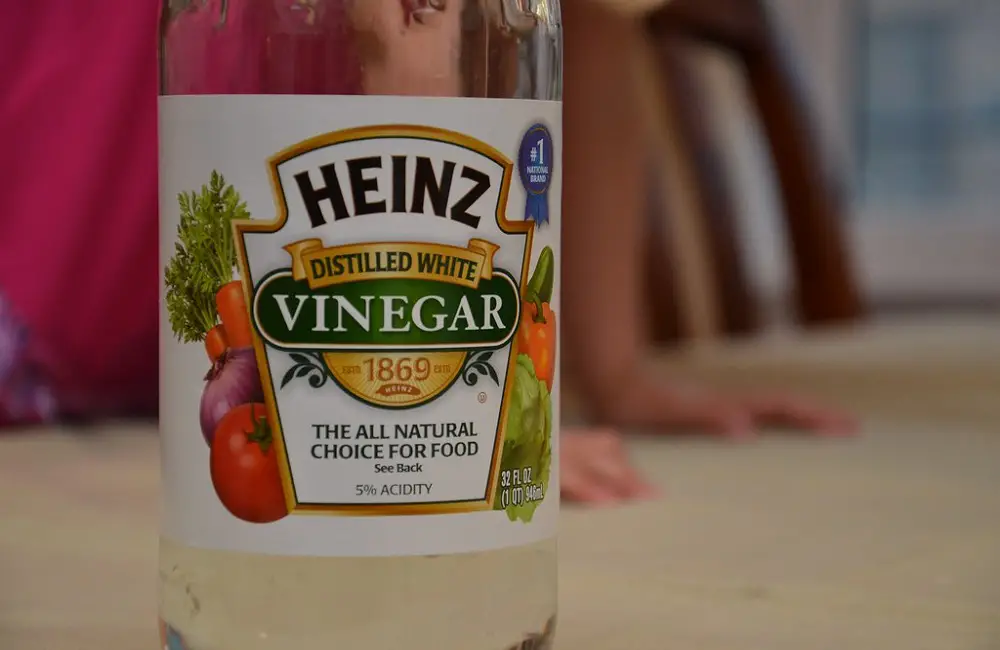When it comes to ensuring the health of your family and pets, using non-chemical cleaners to clean your home is undoubtedly the best choice. Among these alternatives, vinegar has gained a reputation as a versatile and effective household cleaner.
While recent studies have shed light on vinegar’s limitations as an all-round cleaner, it still holds significant value for various cleaning tasks in your home.
In today’s discussion, we will explore the different ways you can effectively clean with vinegar. So, continue reading to discover insightful tips and techniques.
Glass Cleaner
Combining equal parts of white vinegar and warm water is a highly effective formula for window cleaning. When used correctly, this vinegar-based window cleaner will leave your glass surfaces bright, streak-free, and sparkling clean.
To achieve optimal results, you can use either a squeegee or the black and white pages from a newspaper soaked in vinegar water to clean the windows. After cleaning, make sure to wipe the windows dry.
Not only does this method leave your windows and mirrors sparkling clean, but it also ensures they are lint-free. If you’re seeking an alternative to Windex for cleaning your mirrors, using vinegar is a great option to consider.
Mild Floor Cleaning
It is generally not recommended to use vinegar as a regular wood floor cleaner. However, if you find the need for a mild cleaning solution, you can mix ½ cup of white vinegar with a gallon of hot water. When using this mixture, make sure to wring out the mop as much as possible to avoid excessive moisture on the wood floor.
Damp mopping with vinegar solution provides a light cleaning while also disinfecting the surface. This can be particularly beneficial if you have small children who are still in the crawling stages and require a clean and safe environment.
Clothing Deodorizer and Fabric Softener
If you have a child who frequently forgets to empty their gym bag, or if you’re an adult with a regular workout routine, you’re likely familiar with the persistent, unpleasant odor that clings to gym clothes. Standard laundry soap alone often fails to completely eliminate this funky smell. Fortunately, there’s a simple and effective solution: using baking soda and vinegar.
To deodorize and remove any mildew scent from clothing, add ¼ cup of baking soda to your laundry detergent during the wash cycle. Then, during the rinse, incorporate ½ a cup of vinegar. By following this method, you’ll achieve not only clean and fresh-smelling clothes but also softer garments.
Calcium Remover
Vinegar is exceptionally effective for removing calcium deposits. It can be used on its own or mixed with hot water, depending on the severity of the build-up, to eliminate calcium build-up from clothes and dishwashers.
When it comes to descaling a tea kettle, a mixture of equal parts vinegar and water can be used. Simply let the kettle boil after adding the mixture. Afterward, it is imperative to rinse the kettle thoroughly with fresh water to eliminate any lingering vinegar taste.
Moreover, to address lingering calcium build-up in a coffee pot, pour undiluted vinegar into the reservoir. Run a cycle of vinegar-laden coffee and follow up with at least two reservoirs of clean water to ensure the complete removal of any residual vinegar.
Mold and Mildew Prevention
Mold and mildew are common issues in damp areas, particularly in bathrooms and kitchens. To effectively prevent the growth of mold and mildew spores, you can create a solution by combining 1 part hydrogen peroxide and 1 part vinegar.
Transfer the solution into a spray bottle and use it to clean these areas on a weekly basis. This routine maintenance will help keep your home free from the harmful effects of mold and mildew, ensuring a healthier living environment for you and your family.
All Purpose Disinfectant
Vinegar, although not an optimal home cleaner, serves as an effective disinfectant. A simple yet powerful solution can be made by mixing 1 cup of distilled water, 1 cup of white vinegar, and 15 drops of essential oils.
This versatile disinfectant can be applied on various surfaces in your kitchen and bathroom, ensuring the cleanliness and hygiene of your countertops, toilet, sink, and tub.
While the essential oils add a pleasant scent to the disinfectant, it’s important to note that you can achieve effective disinfection without them.
Air Freshener
Vinegar, surprisingly, can serve as an effective air freshener to eliminate a wide range of unpleasant odors from the surrounding atmosphere. To create your homemade air freshener, simply combine equal parts (½ cup) of vinegar and water in a misting bottle.
Utilize this solution to invigorate and freshen the air in any room within your humble abode. The remarkable versatility of vinegar makes it an excellent choice for maintaining a pleasant and welcoming indoor environment.
What Not to Clean with Vinegar
Vinegar is a versatile cleaning agent with a wide range of applications. However, it is crucial to note that there are specific items that should never be cleaned with vinegar. To ensure proper maintenance and avoid damage, it is important to be aware of these items. Some examples of items that should not be cleaned with vinegar include:
Natural Stone Surfaces
It is strongly advised to avoid cleaning natural stone surfaces, such as granite or marble countertops, using vinegar or any other cleaning solution with acidic properties. The acid in vinegar has the potential to cause significant damage to these valuable and costly items, making it imperative to handle them with utmost care.
It is recommended to utilize specialized cleaning products explicitly designed for the maintenance and preservation of natural stone surfaces. By doing so, you can ensure their longevity and retain their aesthetic appeal for years to come.
Grout
Vinegar can potentially damage your grout due to its acidic properties. The acid in vinegar corrodes the grout, leading to the dissolution of the top layers of grout molecules, thereby causing tile loosening. It is important to be cautious when using vinegar on grout surfaces to ensure their durability and integrity.
Waxed Floors and Furniture
To prevent damage to your well-maintained waxed floors and furniture, it is advisable to refrain from using vinegar as a cleaning solution. Repeated applications of vinegar can gradually degrade and remove the protective wax layer, diminishing the longevity and appearance of these surfaces over time.
Therefore, it is recommended to explore alternative cleaning methods that are specifically designed for the preservation of waxed floors and furniture.
Phone/Tablet
Vinegar has the potential to gradually erode the protective layer of your phone or tablet screen, ultimately causing damage to the screen. Therefore, it is highly recommended to refrain from using vinegar on delicate device screens in order to maintain their longevity and functionality.
Egg Spill or Splatter
Vinegar can cause egg spills or splatters to coagulate, resulting in a more challenging cleaning process. This is due to the chemical reaction between vinegar and the proteins in the egg, which leads to a solidification effect. As a result, the egg residue may adhere more strongly to surfaces, requiring extra effort for thorough cleaning.
Final Thoughts
There are numerous practical applications for inexpensive vinegar in cleaning various items within your home. However, it is crucial to note that there are specific items that should not be cleaned using vinegar due to potential damage.

